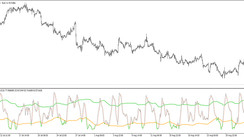The Swiss franc (CHF) is the official currency of Switzerland and Liechtenstein. It is also used in the Italian exclave of Campione d'Italia. The CHF is a relatively strong currency, and is often seen as a safe haven asset.
The CHF was first introduced in 1850 and has since gone through a number of changes. In 1907, the Swiss National Bank (SNB) was founded, and it became the sole issuer of the CHF. In 2000, Switzerland joined the European Economic Area (EEA), but the CHF did not adopt the euro.
Current Situation
The CHF is currently trading at a strong level against a number of other currencies, including the US dollar, the euro, and the Japanese yen. This is due to a number of factors, including Switzerland's strong economy, its political stability, and its status as a safe haven asset.
Future Prediction
The future of the CHF is uncertain. Some experts believe that the CHF will continue to strengthen in the near term, while others believe that it will start to weaken. It is important to monitor the situation closely and adjust your trading strategy accordingly.
What Affects the Price of the CHF?
The price of the CHF is affected by a number of factors, including:
The Swiss economy: The strength of the Swiss economy is a major factor in the price of CHF. If the Swiss economy is doing well, the CHF is likely to strengthen.
Interest rates: The level of interest rates in Switzerland is also a major factor in the price of CHF. If interest rates in Switzerland are higher than interest rates in other countries, the CHF is likely to strengthen.
Geopolitical events: Geopolitical events can also affect the price of the CHF. For example, if there is a risk of war in Europe, the CHF is likely to strengthen as investors seek a safe haven asset.
A number of experts have given their predictions for the future of the CHF.
Philipp Weckherlin, chief economist at Swissquote Bank: "I believe that the CHF will continue to strengthen in the near term. The Swiss economy is doing well, and interest rates in Switzerland are higher than interest rates in other countries. This makes the CHF an attractive investment for investors."
Chris Turner, currency strategist at ING: "I think the CHF is likely to weaken in the long term. The Swiss economy is facing a number of challenges, including a declining population and an aging workforce. This will put pressure on the Swiss franc."
Tips and Strategies for Trading the CHF
If you are considering trading the CHF, there are a few things you should keep in mind:
Doing your research: Before you trade any currency, it is important to do your research and understand the factors that affect its price. This includes the Swiss economy, interest rates, and geopolitical events.
Using a reputable broker: When you are trading currencies, it is important to use a reputable broker. This will help to protect your money and ensure that you are getting the best possible prices.
Setting stop-losses: It is important to set stop-losses when you are trading currencies. This will help to limit your losses if the market moves against you.
Being patient: Trading currencies can be volatile, so it is important to be patient. Don't expect to make a lot of money overnight.
Conclusion
The CHF is a relatively strong currency and is often seen as a safe haven asset. The future of the CHF is uncertain, but there are a number of factors that could affect its price in the future. If you are considering trading the CHF, it is important to do your research and understand the risks involved.





